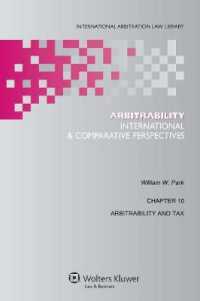Full Description
Hyperlocal Organizing: Collaborating for Recovery Over Time explores the difficult work of post-disaster recovery. Jack L. Harris, demonstrates that after disaster, broad interorganizational landscapes are needed to unite the grassroots, neighborhoods, communities, and institutions to solve problems of recovery and bring people home. Yet all too often, government disaster policy and institutions ignore the critical role of local knowledge and organizing. Exploring the organizational landscape of the mid-Atlantic United States after Hurricane Sandy, Harris reveals how participation and collaboration open multiple pathways to recovery after disaster by building resilience and democratizing governance. Using powerful theories of communicating and organizing, this book develops a new framework—hyperlocal organizing—to address the challenge of community survivability in the twenty-first century. Achieving community survivability requires robust organizational partnerships and interorganizational collaboration to solve collective problems. The lessons Harris presents are important not just for post-disaster recovery, but for addressing grand challenges such as climate change, environmental justice, and equitable community development. Scholars of environmental communication, disaster studies, and emergency management, will find this book of particular interest.
Contents
Table of Contents
Dedication
Acknowledgements
Introduction: Perpetual Disaster Response and Recovery: the New Normal?
Chapter 1: Communicating and Organizing after Disaster
Chapter 2: How Public Policy Shapes the Organizational Landscape of Disaster Recovery
Chapter 3: Writing Community Back into Disaster Recovery: Hyperlocal Organizing and Interorganizational Relationships
Chapter 4: Using Stakeholder Theory to Build Theories of Hyperlocal Organizing
Chapter 5: Hyperlocal Organizing after Hurricane Sandy: The View from Coastal New Jersey and Staten Island New York
Chapter 6: Empowering Community through Hyperlocal Organizing: Implications for Social Resilience and Democratic Governance
Appendix A
Appendix B
References
About the Author







